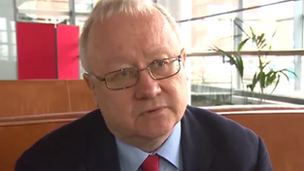Welsh education: Estyn urges more help for best pupils
- Published
Estyn says fewer schools achieved good or excellent inspections compared with last year
Wales' schools inspection body Estyn is concerned not enough is being done to get the most out of the best pupils.
In its annual report, Estyn said fewer schools achieved good or excellent inspections compared with last year.
Opposition parties said it made for "sad reading about the current state of education in Wales".
The Welsh government said the areas identified as needing attention - literacy, numeracy and strengthening leadership - mirrored its priorities.
Estyn said there are some strengths across the board in Welsh schools but there was also too much "unevenness".
One in every seven secondary schools was considered excellent, but equally, one in every seven was deemed unsatisfactory, it said.
Chief inspector Ann Keane said she believes some teachers give better support and attention to lower achievers, which is why, in part, fewer pupils gained grades A and A* at GCSE.
"We see in our inspection too much unevenness in the classroom. This is something for heads to challenge and teachers themselves," she told BBC Radio Wales.
"It is an issue in a quarter of primary schools and a half of secondary schools that there is this unevenness.

Education Minister Leighton Andrews is to consider the report's findings
"It is a matter not merely of tackling poor and mediocre performance but also managing the changes we need to see happening in the curriculum, in the classroom, in order to improve those standards of literacy and numeracy that really underpin all the achievements that pupils can make."
The report said: "In a significant minority of primary schools, more able pupils do not make enough progress.
"Although most go on to achieve the expected level for their year group, too few of these pupils gain the higher levels."
It also expressed concerns about the level of reading, writing and numeracy skills across all sectors.
It said: "While a few schools have excellent skills provision, we need to achieve better standards of literacy in over half of all primary and secondary schools.
"Pupils often lack confidence in their basic number skills, such as division and working with fractions, and are reluctant to apply them to solve problems, particularly in the context of other subjects such as science and technology.
"Standards of writing are a concern across all sectors."
The report also highlights the need for school leaders to get more out of teachers and raises concerns about absenteeism levels.
Chris Keates, general secretary of the NASUWT, said: "Regrettably, Estyn appears to be emulating the inspectorate in England and becoming the hit squad of the education minister.
"Public services need a robust, independent inspectorate acting in the interests of the public, not promoting the policy prejudices of ministers.
"On the basis of this report Estyn should be graded as 'barely adequate'."
Welsh Conservative education spokesperson, Angela Burns AM, said Estyn's conclusions made for "worrying but sadly not surprising reading".
She said: "It is worrying that the number of schools ranked good or excellent has declined since last year and that around 50% of schools underperformed to the extent that they need a follow-up inspection.
"Our best teachers should be encouraged to share best practice, while the education minister needs to adequately resource his reforms and work constructively with teachers to help drive up standards."
Welsh Lib Dem education spokesman Aled Roberts AM said: "The Welsh Labour government first believed that scrapping annual exams was the answer to improving numeracy and literacy.
"Now, after years of decline in school standards, the education minister is reversing that decision.
Estyn chief inspector Ann Keane
"Following over 13 years of Labour rule, teachers and schools have been given no clear direction and it is Welsh pupils that are paying the price for this chaotic approach to education."
A Welsh government spokesperson said: "The positives in today's report are welcome and encouraging.
"Through rigorous policies, like our national implementation plan for 3 to 16 education (Improving Schools), the National Literacy and Numeracy Framework and through training and developing leaders for the future, we're delivering for our learners.
"We share Estyn's concerns about the number of local authorities who are not performing as well as they should.
"It is one of the reasons why the minister has brought forward an in-depth review of the effectiveness of the current education delivery system in Wales."
Plaid Cymru education spokesman Simon Thomas said: "It is unacceptable that so many young people are leaving school without the basic skills that they need to progress into further education or employment or to get by in day to day life."
Mr Thomas said his party opposed external tests for pupils before they do GCSEs, saying teachers should be trained to assess children properly.
- Published21 November 2012
- Published20 November 2012
- Published9 November 2012
- Published31 July 2012
- Published31 July 2012
- Published24 April 2012